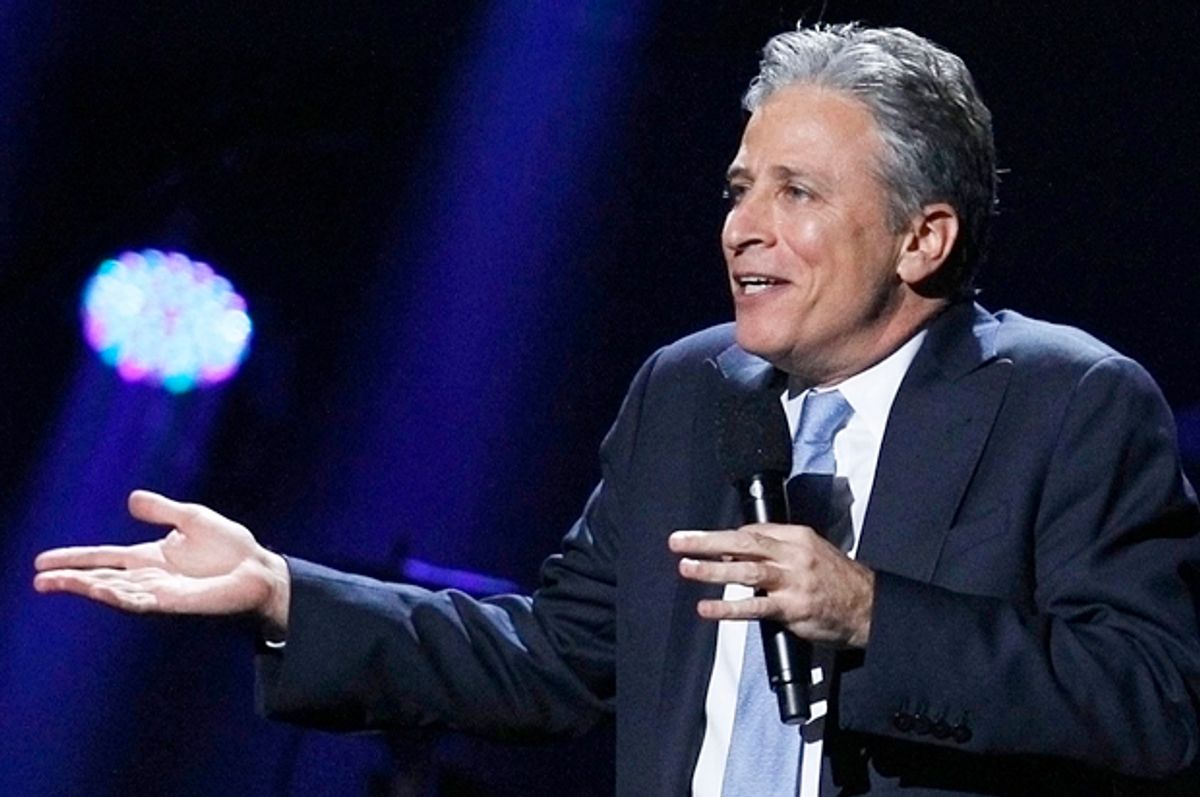We know that satire news is increasingly a source of “real” news. We know that Jon Stewart has been voted as the No. 4 most trusted journalist, tying with Brian Williams and Dan Rather (that poll was in 2008). We know that satirists like Stewart have an active and engaged viewership of mostly millennials. And we know that over the years Stewart has been able to attract an impressive lineup of politicians, journalists and other newsmakers to appear on his interview segment.
So the recent news that he was courted by NBC to host "Meet the Press" should come as no big surprise. It all makes sense, right? Stewart has increasingly moved into the role of a trusted newsman and his viewers are the demographic "Meet the Press" would like to attract. So following this logic, NBC made him a huge offer to help boost the show. One source explained that NBC was prepared to offer Stewart virtually “anything" to bring him over. "They were ready to back the Brink's truck up," the source said. And yet Stewart declined.
While others speculate on why Stewart turned the job down, I’d like to focus on how the idea was crazy in the first place. We can begin by asking whether Stewart really has the chops to host such a show. Or we could suggest that Stewart’s interviews are at best uneven, often devolving into too much of a love fest with the guest. But there is much more at stake here. The key question everyone should be asking is, how has Stewart’s satirical comedy gotten so confused with news reporting?
Let’s remember that Stewart is actually a comedian and "Meet the Press" is a serious news show. I suspect that at least one reason Stewart turned down the job was because he actually likes doing satirical comedy and has no interest in losing that side of his job. What is fascinating about NBC’s apparent confusion about Stewart’s professional identity as a comedian is that it reveals that in the public mind today there is almost no distinction between serious news and satirical news. While satire is increasingly playing a greater and greater role in shaping the public’s understanding of politics, the fact remains that we still need a separation between satire and straight news.
Now to be fair, Stewart has often blended his identity as a comedian and a newsman: so its understandable NBC might have been confused. There was his epic performance on CNN’s "Crossfire" in 2004 when he effectively destroyed the show by calling out Tucker Carlson for his poor journalism. Then there was his take down of CNBC’s Jim Cramer in 2008 when he showed how Cramer had encouraged investing in Bear Stearns before its massive collapse. And who could forget his 90-minute debate with Bill O’Reilly in 2012?
The point is that Stewart has become a more and more central source of news and that has meant that his identity as a comedian has often been buried. This shift has taken place because serious news often seems like nothing more than scandal, fluff and hysteria. When Megyn Kelly does a piece for Fox News on whether or not Santa is white and Stewart interviews First Responders on Comedy Central to help support their healthcare bill, we can observe that the traditional roles of comedy and news have been inverted.
But that inversion, as entertaining as it can be, should not be the model for political news reporting. Satire is meant to comment on the news, not be its source. So, even if the satirists have been better than journalists at asking the critical questions our nation needs answered, we still need to push the journalists to do their job-- not replace them with comedians. The point is that, if Stewart had taken over "Meet the Press," it would have been bad news for journalism.
Even worse, it would have been bad news for satire. Satire steps in to question the status quo, to call attention to public folly, and to remind us to use healthy skepticism in our judgments. Satire strengthens the news media by asking more of it and exposing its failures. And it does so in a way that is entertaining and energizing. But satire can’t exist without an object to parody. If we replace the “real” news with satire, then satire will cease to have its critical source. So, we should all be grateful that despite NBC’s lapse of judgment, Stewart still knows what he is doing.



Shares